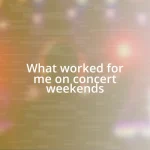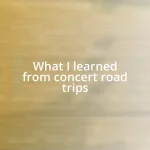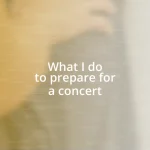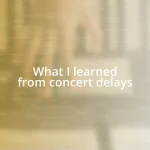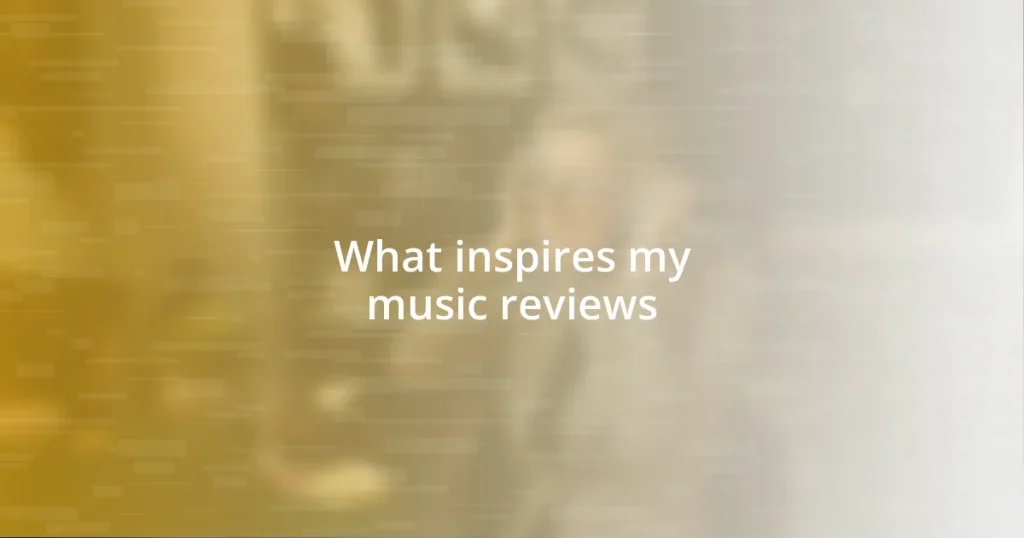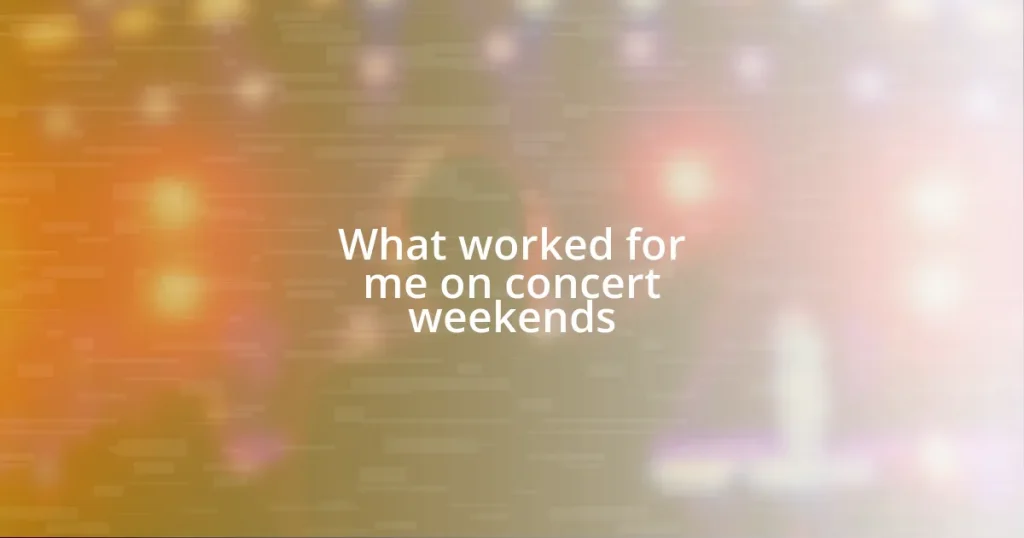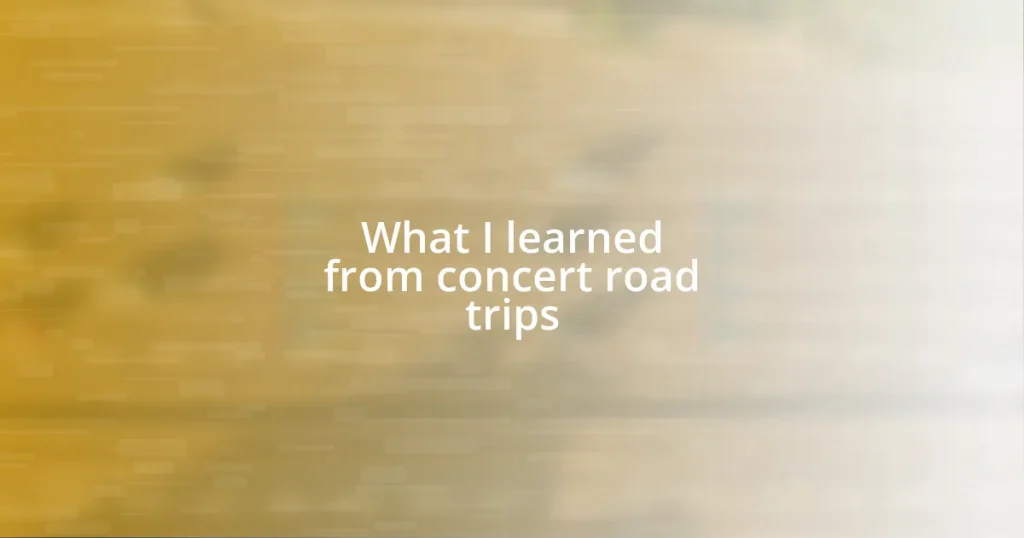Key takeaways:
- Music reviews are deeply influenced by the writer’s personal experiences and emotional connections to songs, which create a dialogue between the reviewer and the artist.
- Audience feedback is essential in shaping reviews, as diverse interpretations enrich the understanding of music and foster a communal experience.
- Effective reviews utilize vivid imagery, personal anecdotes, and engaging questions to evoke emotions and encourage reader reflection.
- Cultural context and societal themes play a crucial role in analyzing music, prompting discussions about broader implications and social issues within songs.
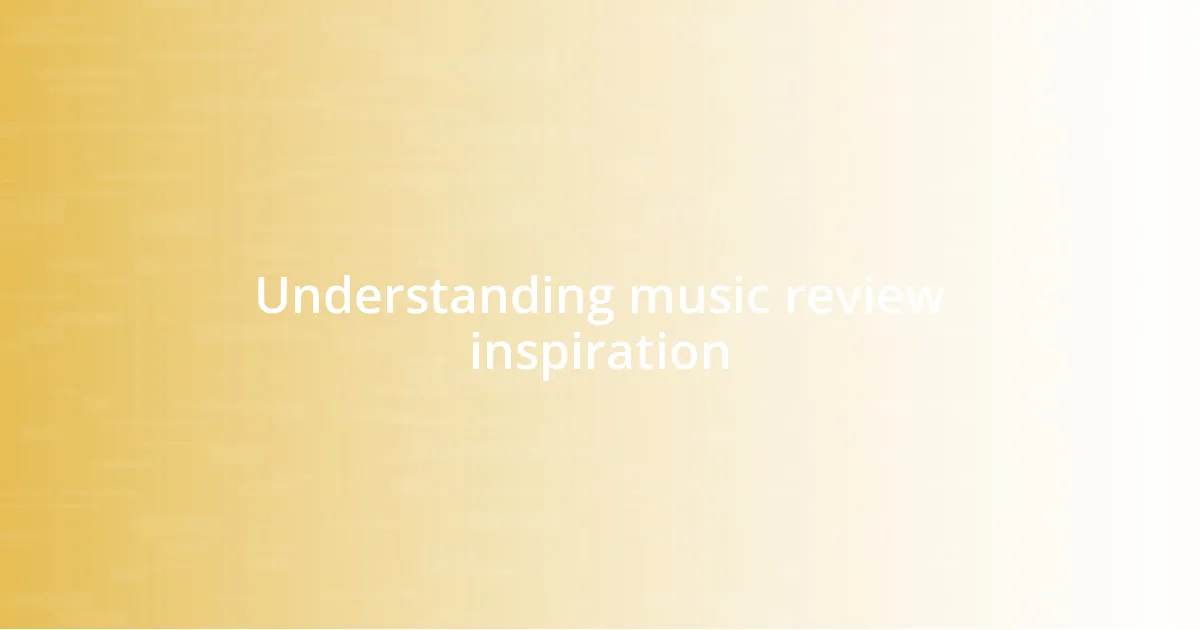
Understanding music review inspiration
Understanding what inspires my music reviews often stems from my own experiences with music. I remember a late-night drive where a song transported me back to a significant moment in my life; that emotional connection fuels the way I articulate my thoughts. Have you ever felt a song resonate with your own experiences? It’s that visceral reaction that I aim to capture in my reviews.
There’s also a curiosity that drives my exploration of various genres. Recently, I stumbled upon a lesser-known artist whose lyrics mirrored my thoughts during a challenging time. I found myself reflecting on the delicate balance between personal narrative and broader themes while I wrote about their work. How does uncovering new sounds shift your perspective on music? For me, it’s an exhilarating journey that keeps my passion alive.
Every review becomes a dialogue between me and the artist, informed by the emotions their music evokes within me. There are times when I feel a piece resonates so deeply that it almost demands exploration—a responsibility to share that emotion with others. Isn’t it fascinating how a few notes can spark a flood of thoughts? This connection makes every review not just an analysis, but a heartfelt conversation worth having.
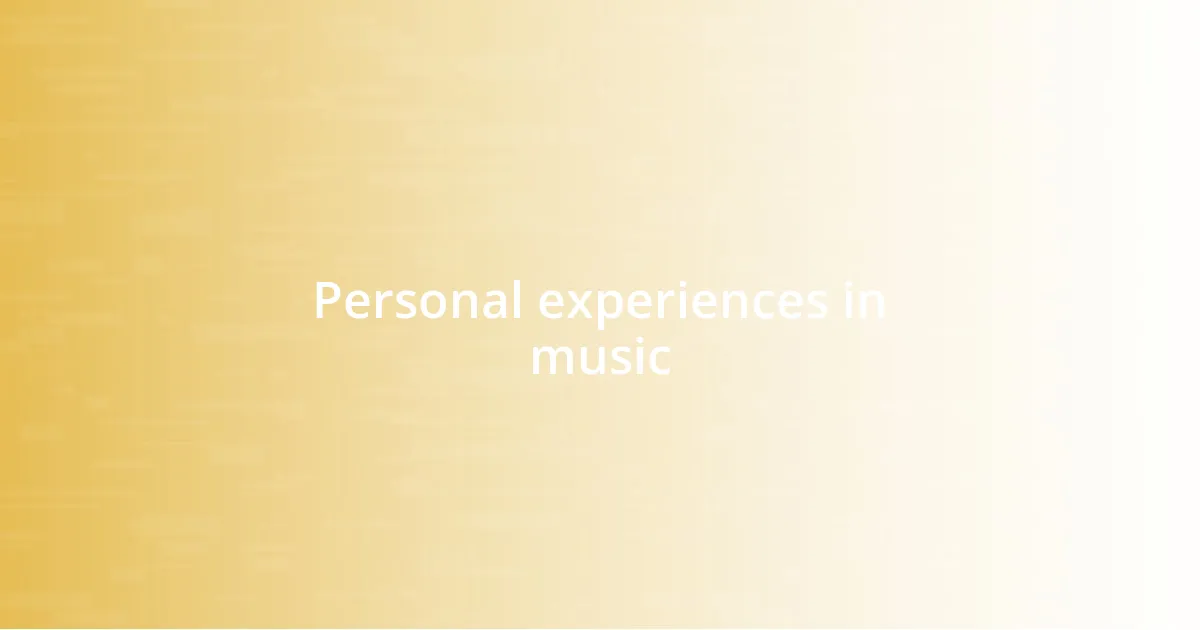
Personal experiences in music
Music has a way of intertwining itself with our lives, doesn’t it? I remember sitting in my room as a teenager, headphones on, listening to a song that captured my angst perfectly. The lyrics reflected the turmoil I felt about friendships shifting and growing up. In that moment, I didn’t just hear the music; I lived it. It’s these raw experiences that shape my reviews, allowing me to connect intimately with the artist’s intent.
- The first concert I ever attended was an eye-opening experience. I was surrounded by strangers, all united by the same melodic emotions.
- Discovering a nostalgic song can bring back vividly cherished memories, reminding me of fleeting moments, like a summer spent with friends.
- I often find myself revisiting tracks linked to personal milestones—graduations, heartbreaks—making each review an exploration of my journey through life.
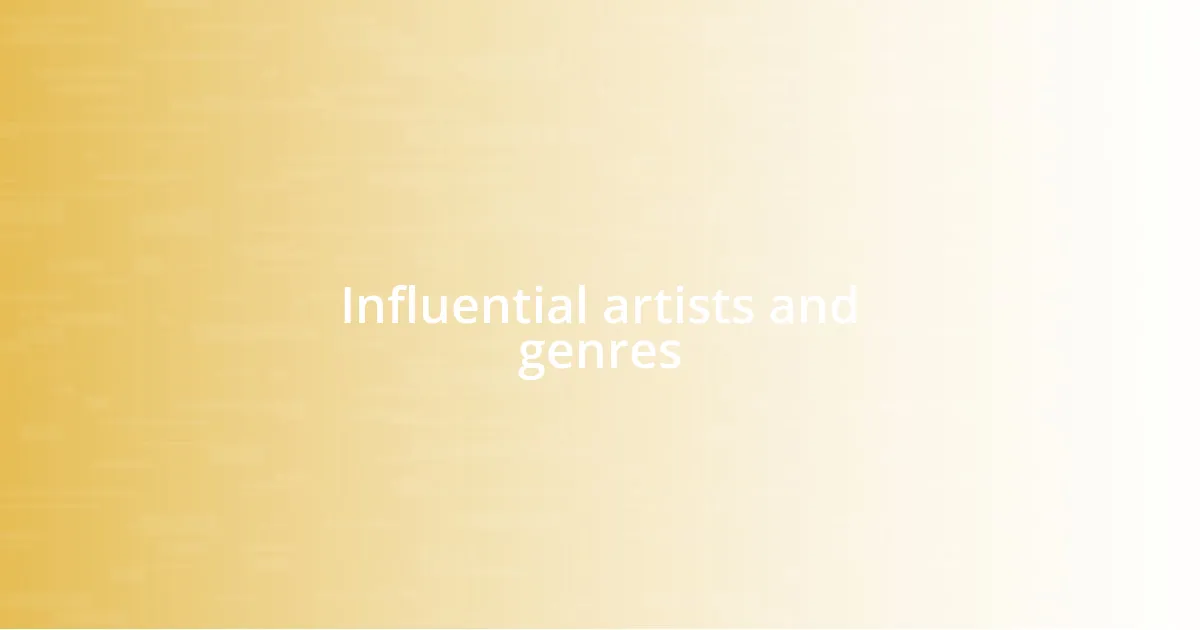
Influential artists and genres
Artistic influence can often be traced back to a few standout artists who fundamentally shape our musical landscape. For instance, when I listen to the powerful melodies of Nina Simone, I’m reminded of her ability to blend genres while tackling intense societal issues. This fusion of jazz, blues, and soul not only inspires me but urges me to consider how artists can use their platform for change. What about you? Can you think of a specific artist who changed your view on a genre?
On the other hand, the genre of hip-hop had a significant impact on my understanding of storytelling in music. The intricate wordplay and relatable narratives from artists like Kendrick Lamar have pushed my reviews to evolve beyond technical analysis to include emotional depth. In a way, discovering hip-hop felt like pulling back a curtain on raw human experience. Reflecting on how rap artists articulate struggles gives me a fresh perspective each time I sit down to write.
The world of classical music also deserves mention, notably composers like Beethoven, who convey profound emotion through orchestral arrangements. I often find that a single symphonic movement can encapsulate a journey of grief or triumph, echoing my own experiences. Have you ever felt a piece of music resonate so strongly that you just had to share it? It’s moments like these that remind me how interconnected we all are through the universal language of music.
| Influential Artists | Genres |
|---|---|
| Nina Simone | Jazz, Blues, Soul |
| Kendrick Lamar | Hip-Hop |
| Beethoven | Classical |
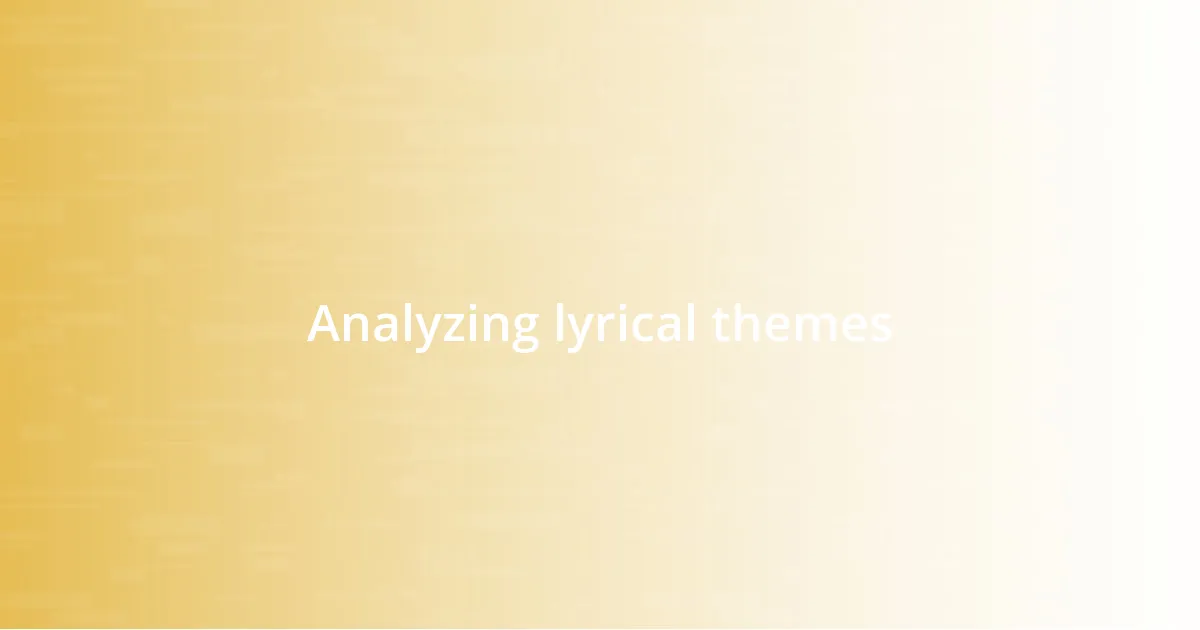
Analyzing lyrical themes
When I dive into a song’s lyrics, I’m often struck by recurring themes that resonate deeply within me. For example, the exploration of love—both its highs and lows—often mirrors my own experiences, making me pause and reflect. Do you ever find yourself captivated by a line that seems to narrate your own story? I know I do, and it’s this connection that drives me to analyze the layers of meaning in the lyrics.
Take the theme of resilience, which frequently appears in powerful anthems. I remember listening to “Fight Song” by Rachel Platten during a challenging time in my life. The lyrics spoke to my struggles, urging me to embrace my strength and push through adversity. It’s those moments when a song feels like a battle cry that compel me to dissect the message and share its impact with others, allowing them to feel that same spark of determination.
Then there are those lyrics that capture societal struggles, which can be incredibly poignant. A thought-provoking artist like Hozier has a gift for weaving social commentary into his songs. When I listen to “Take Me to Church,” I’m reminded of the complexities surrounding love and identity, which prompts me to consider the broader implications of his words. Are these themes not just reflections of personal strife but also a call to action for change? Engaging with such lyrics in my reviews fosters a dialogue about what music can mean in a larger context, and that’s an exploration I find endlessly rewarding.
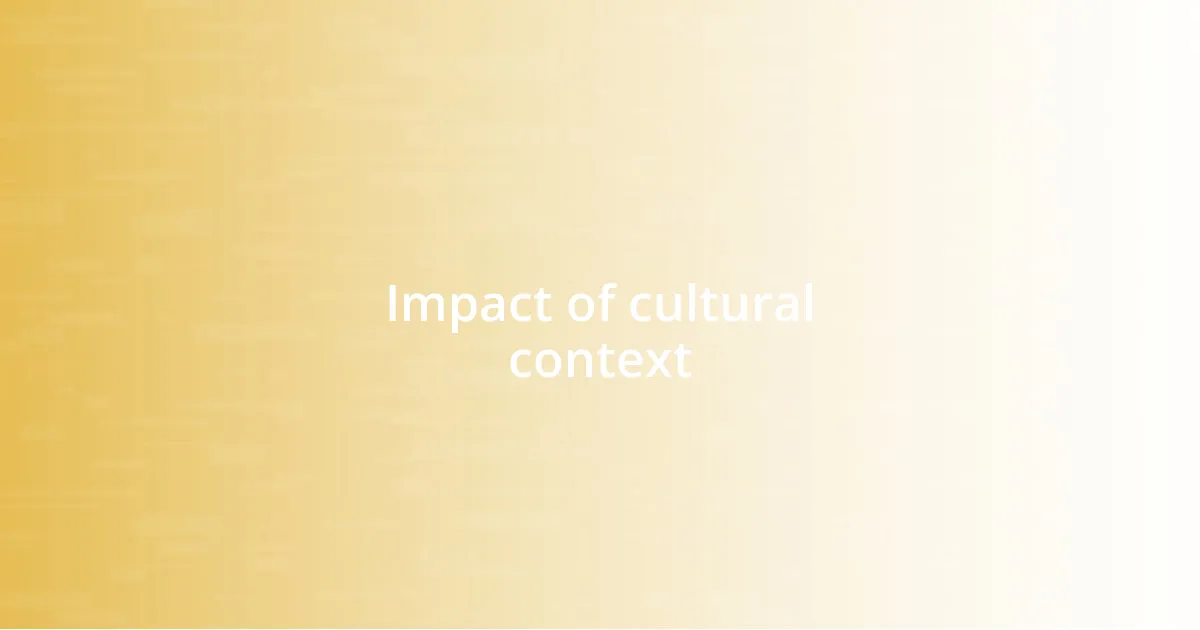
Impact of cultural context
Culture shapes our experiences and perceptions of music in profound ways. When I listen to a song imbued with cultural references, I often find myself seeking to understand the context behind those elements. Take reggaeton, for instance. Listening to Bad Bunny’s tracks introduces me to stories about life in Puerto Rico, layered with cultural pride and societal commentary. This accentuates how music serves not only as entertainment but also as a window into a different way of life.
I recall a time when I attended a traditional Indian musical performance. The rhythms and melodies were steeped in history, conveying emotions that felt foreign yet deeply moving. It dawned on me how cultural context enriches music, creating a tapestry of meaning that is often lost in mainstream interpretations. How does my cultural background influence my perception of music? I’ve realized that certain sounds evoke feelings of nostalgia and familiarity, shaping my musical taste and critical approach.
Furthermore, I’ve noticed how the global influence of movements like Black Lives Matter has spurred artists to create music that reflects urgent social issues. Listening to tracks that address systemic racism, such as those by J. Cole, compels me to examine my own perspectives and biases. This dialogue is crucial—not just for me, but for all of us. How can we ignore the social tapestry woven into the melodies and lyrics? Acknowledging these connections in my reviews enhances the richness of the listening experience, inviting others to reflect on their own cultural understandings.
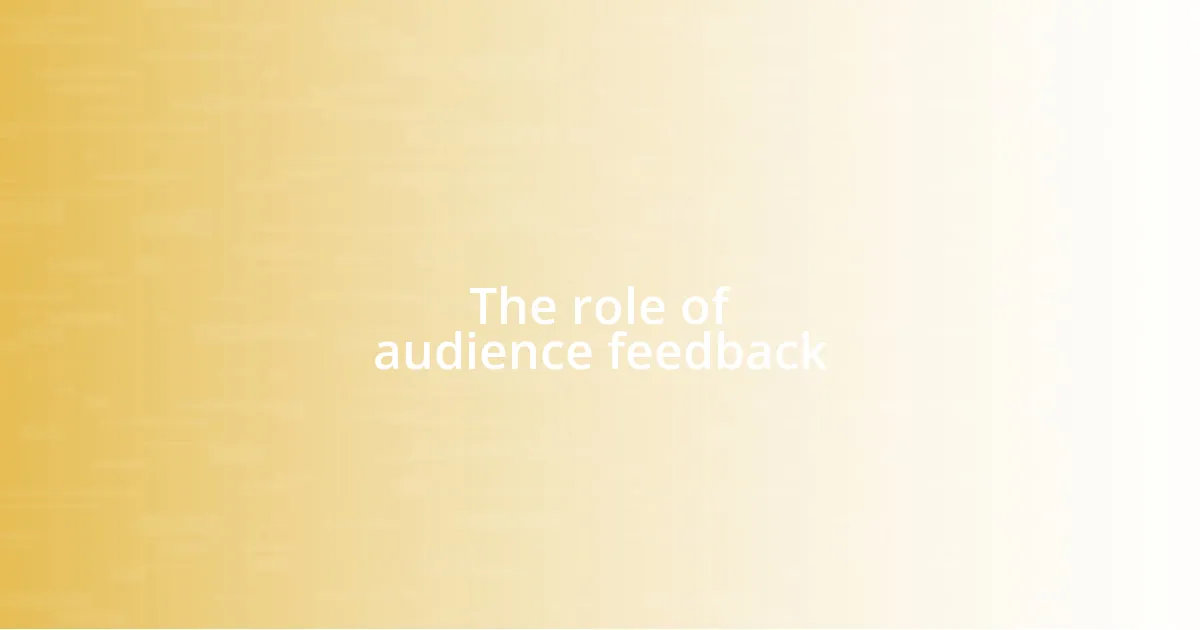
The role of audience feedback
Feedback from my audience plays an essential role in shaping my music reviews. I remember a particular instance when I wrote about a lesser-known indie artist, and several readers reached out, sharing their own connections to the music. Their enthusiasm and perspectives opened my eyes to themes I hadn’t even considered, making me realize that the beauty of music lies in its capacity to resonate differently with each listener. How often do we overlook the diverse interpretations that can emerge from a single song?
The dialogue sparked by audience feedback encourages me to refine my analyses. For example, after posting a review of a hip-hop album, some followers pointed out parallels between the artist’s experiences and societal issues that I hadn’t fully explored. This exchange not only deepened my understanding but allowed my reviews to better reflect the vibrant tapestry of opinions and emotions that surround music. Do you ever feel like your views evolve when you hear others share their thoughts? I certainly do, and it fuels my desire to explore these layers even further in my writing.
I cherish the moments when readers engage with my reviews and share their own stories. Recently, someone commented about how a particular song helped them cope with loss, igniting a personal conversation about grief in my next piece. This connection transforms music into a communal experience, where shared feelings and insights can create a sense of belonging. Isn’t it amazing how music can bridge gaps between individuals, turning distant notes into a shared language? It’s this magic that continuously inspires me to invite audience feedback into my reviews.
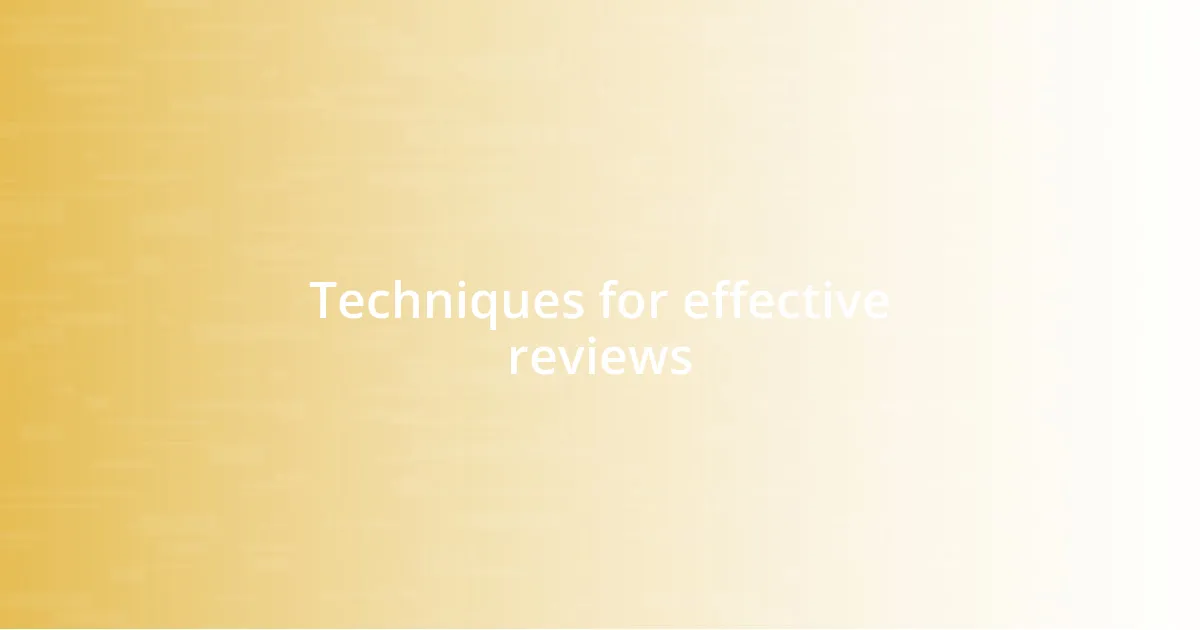
Techniques for effective reviews
When writing effective music reviews, it’s crucial to adopt an engaging, personal tone that resonates with readers. I’ve found that using vivid imagery sparks the reader’s imagination. For instance, describing a particular guitar solo as “whipping through the air like a summer breeze” can evoke emotions that mere statistics or rankings don’t capture. This technique not only enhances the review but makes it a more immersive experience for everyone involved.
Another valuable technique is to draw on emotional connections. I remember reviewing a haunting ballad that reminded me of a bittersweet summer romance. Sharing that personal story brought an authenticity to my review that statistics alone couldn’t convey. Have you ever listened to a song that transported you back to a specific moment in your life? By weaving these intimate experiences into my writing, I invite readers to connect on a deeper emotional level.
Incorporating questions throughout my reviews has also proven effective. Questions like, “What memories does this song evoke for you?” invite readers to reflect and engage actively with the music. During a recent review of a powerful protest anthem, I asked how listeners might view the lyrics in the context of current societal issues, which opened up a rich dialogue in the comments. Encouraging those conversations not only enriches my reviews but fosters a sense of community among readers, making every piece feel like a shared journey.

